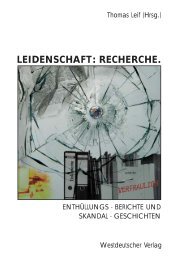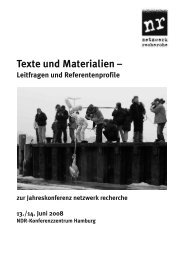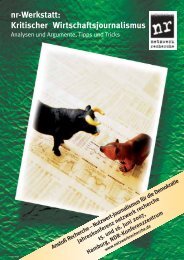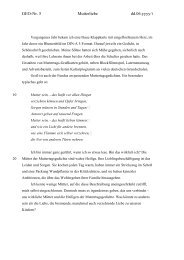Themen, Referenten, Materialien - Netzwerk Recherche
Themen, Referenten, Materialien - Netzwerk Recherche
Themen, Referenten, Materialien - Netzwerk Recherche
Erfolgreiche ePaper selbst erstellen
Machen Sie aus Ihren PDF Publikationen ein blätterbares Flipbook mit unserer einzigartigen Google optimierten e-Paper Software.
egard to such issues.<br />
To what extent do transnational investigations open up new possibilities of cooperation? And when do they run<br />
the risk of becoming elitist?<br />
Interesting question. There is indeed a risk that investigative centres of excellence will become a ‚monopoly‘ of<br />
global cooperation in investigative journalism. In FAIR, we try to counteract that risk by involving our members<br />
in the subject choices and in the team choices for Transnational Investigations. And everybody who produces<br />
a good standard of IJ can become a FAIR member. So the only ‚elitism‘ that is a factor in FAIR is the ‚elitism‘ of<br />
good professional work. Underperformers can not participate. But who wants to work with underperformers? Our<br />
criteria for performance are internationally accepted best practice criteria: ask questions, observe, multisource,<br />
factcheck. Anybody with a good head and work ethic can achieve these criteria, so in that sense it is still very<br />
democratic. We are not talking about brain surgery.<br />
How important are webtools and internet platforms for the cooperation during the research and during the<br />
presentation of the results? What kind of chances do those tools offer?<br />
I am using the web tools as a new experience. In the African context, the information is not generally available<br />
to the public regarding topics of great interest. Internet allows access to some reports and materials from<br />
international institutions about african subjects. Even on the national plan, Internet can assist to find some<br />
material what you can’t find physically because the administration think to keep it secret. During the international<br />
search, it also helps to identify some actors or other journalists who are working on the same subject. Bloggers<br />
and casual Internet users can be associated to make contributions to the subject. This register gives the<br />
interesting results. It also helps to quickly consult an experienced colleague and ask him if you are experiencing<br />
blockage on a very specific point of work. In my own case I am using too much facebook and skype to build<br />
networks and improve my search.<br />
Do transnational stories change the art of story telling?<br />
The most successful stories have always been those of universal meaning. Poor parents abandoning their<br />
children in the woods because they can‘t feed them -Hansel & Gretl- are stories that could have happened in<br />
Africa. So I don‘t think the art of story telling changes. The more transnational, the better the story!<br />
Questions to Annamarie Cumiskey (London based freelance journalist, also Bureau of Investigative Journalism)<br />
Why do you regard it as necessary to conduct transnational investigations?<br />
The EU makes it neccessary. The EU decides policy that is implemented in 27 countries. The media coverage of<br />
the EU is front-loaded meaning that coverage focuses on the policy decisions made in Brussels at the various<br />
stages of negotiation. However, once a decision has been made and the onus is on the member states to<br />
implement the policy the media coverage disappears. There is a major imbalance here. The coverage focuses<br />
on the start of the policy’s lifespan; it’s front-loaded. What’s more important to know is the policy effective? Is it<br />
doing what it should do?<br />
Experience has shown through farmsubsidy.org, fishsubsidy.org and the FT/Bureau investigation that EU’s<br />
policies have a habit of producing results that have the opposite effect of what was intended. This is why it’s<br />
important to carry out transnational investigations.<br />
Are there specific issues which lend themselves more to transnational research endeavours than others?<br />
Issues such as money, human rights and the environment are some examples which lend themselves to<br />
transnational research. What is also important is the thesis. It needs to be a very simple thesis. This way there is<br />
no misunderstandings between the collaborators in different countries about what they should be doing.<br />
To what extent do transnational investigations open up new possibilities of cooperation? And when do they run<br />
the risk of becoming elitist?<br />
There are new opportunitoes for co-operation between journalists on the ground in different countries. The<br />
trouble is finding them. There is no network for investigative journalists within the EU. We really need one.<br />
How important are webtools and internet platforms for the cooperation during the research and during the<br />
presentation of the results? What kind of chances do those tools offer?<br />
Google Docs is excellent. All of the participants can access the documents and make changes simultaenously.<br />
All of the research is in one place. Google translate on CHROME makes research in a foreign language easy.<br />
However, one must be mindful of translation mistakes. Languages are no longer as much a barrier as they were<br />
to transnational research. Without these tools it wouod be much harder and more expensive to carry out these<br />
investigations.<br />
Do transnational stories change the art of story telling?<br />
No. Not at all. They do not change the art of story–telling; the same core elements of story telling have to be<br />
there. However, transnational stories can make story-telling a lot more interesting because it’s an opportunity to<br />
introduce the audience to another way of life, mindset and way of doing things.<br />
Questions to Blaz Zgaga (Slovenian based freelance journalist and Co-founder of the Center for Investigative<br />
Journalism, Slovenia)<br />
Why do you regard it as necessary to conduct transnational investigations?<br />
It is difficult to successfully investigate someone who is, for example, laundering money in a tax heaven from their<br />
home country or arms dealers who are trying to conceal their businesses with middlemen from other countries.<br />
Every investigative journalist knows how many years and how much effort he or she invested into building a<br />
network of confidential sources in their own society. No foreign journalist can ever build the same network in a<br />
few days, weeks or months. Therefore, the cooperation of investigative journalists with developed networks from<br />
different countries is offering far bigger possibilities for in-depth and successful investigations.<br />
Are there specific issues which lend themselves more to transnational research endeavours than others?<br />
Exclusive cooperation is a must when cross-border investigations are initiated. Trust between journalists from<br />
different countries must be undoubted. Without trust it is hardly possible to realise any serious cross-border<br />
cooperation. Also empathy is an important part of cooperation. Journalists from one country should try to<br />
understand more what a colleague from the other country is looking for and understand him or her well.<br />
To what extent do transnational investigations open up new possibilities of cooperation? And when do they run<br />
the risk of becoming elitist?<br />
There are as many different ways of cross-border investigations as there are different people or journalists. Any<br />
new cross-border investigation is a new project, where it is difficult to predict new sorts or ways of cooperation.<br />
This is also an argument against the possibility that they could become elitist. In an internet age it is difficult to<br />
defend any “monopoly” over information in media. If a group of journalists will form any closed or “elitist” crossborder<br />
organization, which will behave in an “elitist“ manner and will not be open for new ideas, information,<br />
people and cooperation, it will become obsolete soon.<br />
How important are webtools and internet platforms for the cooperation during the research and during the<br />
presentation of the results? What kind of chances do those tools offer?<br />
I would stress the importance of secure or encrypted emails. Tools like PGP/GPG or web based encryption tools<br />
are easy and also free to use. Usually state agencies can read and decrypt anything, but with a few clicks, a<br />
journalist can get an important saving in time and make any possible surveillance by private investigators or<br />
private security agencies much more difficult. When it comes to the protection of sources, using encrypted emails<br />
during communication processes across borders is much safer.<br />
Do transnational stories change the art of story telling?<br />
Cross-border investigations are changing viewpoints. It is an added value when the journalist is also aware<br />
of how some issues are viewed in a foreign country. And knowing it, this could consciously or un-consciously<br />
influence the story telling.<br />
R4<br />
Samstag, 2. Juli, 11:30<br />
Geknebeltes Land: Journalisten in Belarus<br />
In Kooperation mit n-ost und Reporter ohne Grenzen<br />
Am 19. Dezember 2010 haben Sicherheitskräfte in der belarussischen Hauptstadt Minsk die friedlichen Demonstrationen<br />
gegen die manipulierte Wiederwahl des autoritären Präsidenten Alexander Lukaschenka brutal niedergeknüppelt.<br />
700 Demonstranten wurden willkürlich tagelang inhaftiert, darunter zahlreiche kritische Journalisten.<br />
Derzeit laufen gegen rund 50 Regimegegner Schauprozesse. In einer Podiumsdiskussion fragen n-ost und<br />
ROG wie es um die Pressefreiheit in diesem Land im Herzen Europas ein halbes Jahr nach der Wahl steht (und in<br />
dem Anfang Oktober 2011 auch die jährliche n-ost Medienkonferenz stattfindet, www.n-ost.org/minsk)<br />
Mit: Gemma Pörzgen, Maryna Rakhlei, Victor Martinovich<br />
Leitfragen:<br />
Gibt es Hoffnung?<br />
Unter welchen Bedingungen recherchieren unabhängige und oppositionelle Journalisten derzeit?<br />
Welche ganz konkrete Hilfe brauchen sie und wie können westliche Journalisten ihre belarussischen Kollegen<br />
unterstützen?<br />
Kommt die internationale Hilfe für bedrohte Journalisten und unabhängige Medien seit der Niederschlagung der<br />
Proteste an?<br />
70 71


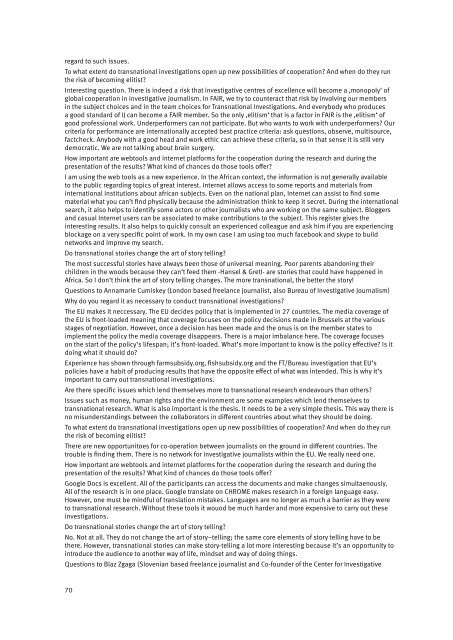
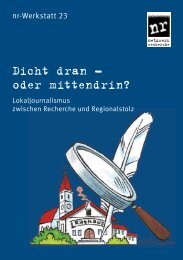
![Kurzbiografien der Referenten und ihre Themen [PDF] - Netzwerk ...](https://img.yumpu.com/21354886/1/184x260/kurzbiografien-der-referenten-und-ihre-themen-pdf-netzwerk-.jpg?quality=85)
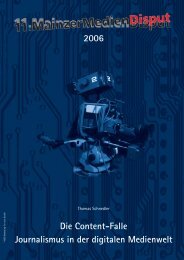
![Rede Frank A. Meyer [PDF] - Netzwerk Recherche](https://img.yumpu.com/21238543/1/184x260/rede-frank-a-meyer-pdf-netzwerk-recherche.jpg?quality=85)

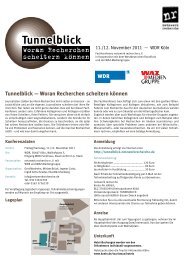
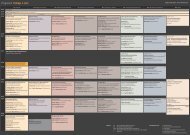
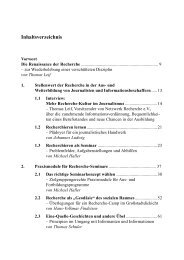
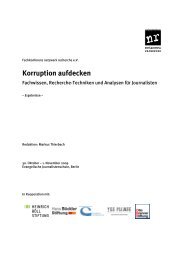
![Die stille Macht [Text] (381 S., 2.142 - Netzwerk Recherche](https://img.yumpu.com/7467581/1/184x260/die-stille-macht-text-381-s-2142-netzwerk-recherche.jpg?quality=85)
